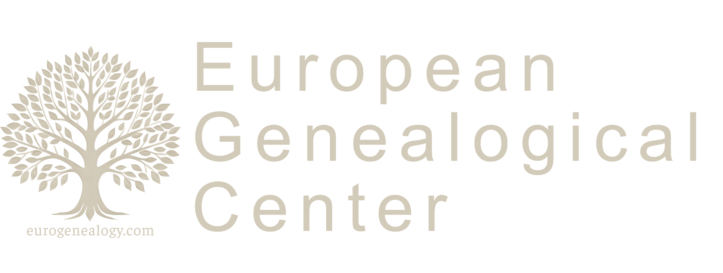Genealogical research in Ukraine — family tree reconstruction
Discover your family history back to the 17th century
Ancestor searches in Ukrainian archives, confirmation of Polish or Jewish heritage and nationality
Every year, more people are interested in discovering their ancestors, finding relatives, and reconstructing their family history. The European Genealogical Center offers a wide range of services, including archival document search, onomastic surname analysis, and compilation of detailed family trees. Ukraine’s history is closely connected with both Eastern and Western cultures, making genealogical research particularly fascinating and full of unexpected discoveries. Sources related to Ukrainian genealogy cover the period from the 17th century to the present. When it comes to noble families, lineage history can go back to the 15th century! Extensive archival materials are available for genealogical research in Ukraine. We work with metric books, confessional lists, population censuses, court documents, and other valuable sources of information about ancestors. These documents help establish dates of birth, marriage, and death, as well as details about professions, places of residence, and social status of relatives. Our specialists conduct in-depth analysis of archival data, trace ancestors by place of residence, and reconstruct complete family histories.
Historically, many ethnic groups lived in Ukraine, including Poles, Jews, Tatars, and other communities. Today, many descendants seek to reconnect with their roots, learn more about their ancestors, and confirm their national origins and family heritage. We assist in verifying Polish or Jewish heritage, compiling all necessary documents for obtaining a Polish Card (Karta Polaka) or for repatriation to Israel. Our experts conduct thorough archival research, carefully examine historical sources, and obtain official documents that clients can submit to consulates for verification. In addition, our team creates comprehensive genealogical books, including archival materials, detailed life histories of ancestors, family photographs, personal letters, and relatives' memoirs. Genealogical research in Ukraine requires extensive knowledge of archival sources and deep understanding of the historical context of different regions. If you wish to restore your family history, our experienced genealogists will meticulously reconstruct your family story, create a detailed and accurate family tree, and preserve the memory of your ancestors for future generations.
Sources of genealogical research in Ukraine
One of the most important documents for genealogical research in Ukraine is the parish metric books, which carefully recorded baptisms, marriages, and deaths across various confessions over many long centuries and historical periods. In Orthodox churches, detailed confessional lists were also maintained, while in Catholic churches and Protestant parishes (kirchen), registers of parishioners attending their local church were systematically and meticulously kept. Population censuses, mainly conducted between 1718 and 1858, provide very detailed and valuable information on family composition, relationships, and household members. This genealogical “triad” (metrics, confessions, and revisions) applies to almost all regions that were part of the Russian Empire. One of the frequently requested services of our center is confirmation of Jewish ancestry or Polish nationality. Metric records and personal documents of Jews or Poles allow their descendants to obtain Israeli citizenship or a residence permit (Karta Polaka) in Poland.


In addition to these sources, our specialists also study other valuable historical materials that reveal detailed biographies of people who lived in previous centuries and important local communities, towns, villages, and surrounding rural areas. These include personal files from the 19th–20th centuries with information about service, employment, and education; forms and service lists; property plans and detailed descriptions; household, conscription, and recruitment lists; distribution records; and tax books. Materials from the 20th century mainly include civil registry documents, household and residence books, as well as archival-investigative files of repressed individuals. The most comprehensive searches also involve population censuses and petitions from the 17th–18th centuries. Beyond the Orthodox population, Catholic, Lutheran, and Jewish communities also lived in present-day Ukraine, leaving a wealth of valuable historical sources that allow detailed reconstruction of family lineages spanning many generations and individual families.
Neighboring countries where we conduct research
Examples of our research
Below you can review examples of research reports received by our customers:
Prices for genealogical services in Ukraine
You can find a detailed price list and description of all services of our center here
Prices for genealogical services in Ukraine
Genealogical research
From €1000
Tracing family history back to the 17th century
Biographical search
From €400 to €1500
Establishing the life story of an individual and their close relatives
Nationality confirmation
From €200 to €1000
Identifying details about a person’s ethnic origin
Document search
From €100 to €500
Obtaining certificates, parish registers, and civil registry records
Family history book
From €2500
Creating a unique publication describing the genus history
Family history website
From €2000
Development of a personal website dedicated to your family’s history
Submit a request, and we will contact you shortly
You can also reach us directly by sending an email to: european.genealogical.center@gmail.com or writing to us in Telegram

european.genealogical.center@gmail.com
© 2026
All rights reserved
All rights reserved
Contact us:

